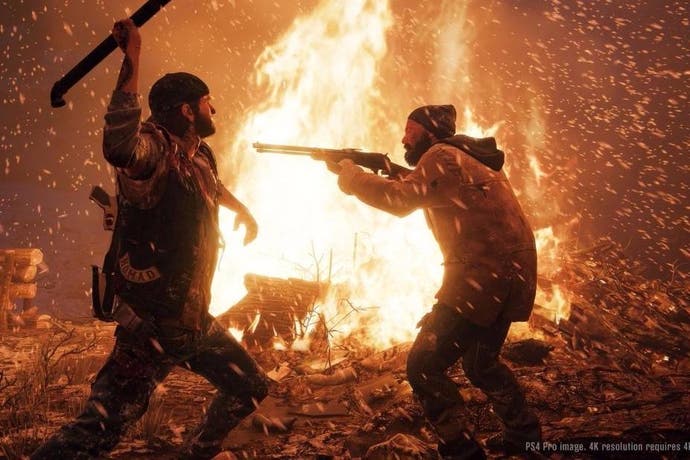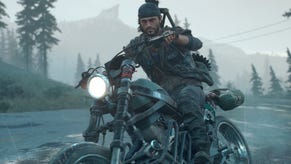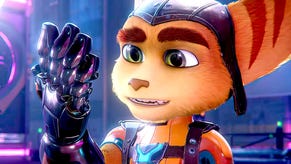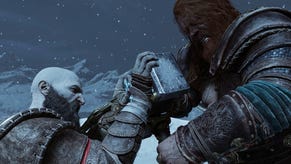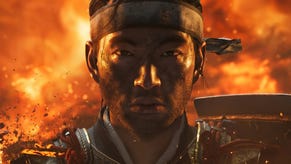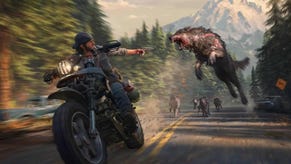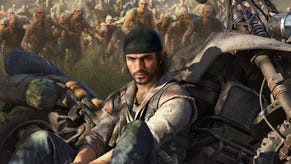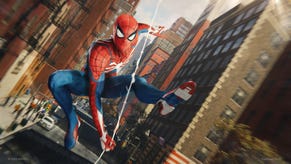Sony's flat E3 conference shows signs of a mid-generation lull
A less than stellar year for PlayStation.
Like Gatsby, Shawn Layden does not like to talk more than he has to. That's the impression that has emerged over a handful of E3s, anyway, as his dapper presence on the PlayStation stage has generally seen him restricting his comments to a few breezy thoughts here and there. He loves games, and he knows, in his collegiate way, that we all love games too. The future is coming! The future is now. He plays with his cuffs, he checks his pocket square. He does a lovely thing with his hands that makes him look like he is shelling peanuts and tossing the husks to the wind. And then he is gone, into the wings while the games take center stage. He doesn't call us "sport", but it is implied. We all know what this is about. We are all here for the same reason.
This year, PlayStation's Gatsby has a rather strange idea of what makes a party. This was exemplary stuff in one manner of speaking. The days in which Sony would stop everything for fifteen minutes to fill us in on a swish marketing deal with Coca-Cola, or a cable show they were thinking of making, are long gone. This is games start to finish, and most of them look pretty good - even if more than you might expect are destined for 2018. Big names, small names, PS4, Pro, and PSVR - no Vita, but the way that that PSVR is hived off into its own segment suggests that it might be the new Vita anyway - this was another show of strength. And yet there is something a little odd about it. Sony's 2017 conference did a very nice line in gloomy spectacle, but it had little thematic range. Video games are beautiful, melancholic affairs, if Sony is to be listened to. They are set, more often than not, in the vast, dripping outdoors, and they are populated by angry or subdued loners engaged in grumpy bursts of hyperviolence.
It did not help that Uncharted: The Lost Legacy that kicked things off lost a lot of its pep due to sound issues that turned it into an echoing arthouse work of brooding menace - or, if you fancy, the deflated comedy of that trailer for The Mummy went out with nothing but the grunts and wails audible. The tone was set, anyway, even if it was by accident. Horizon Zero Dawn followed with a beautiful DLC story called The Frozen Wilds, in which the greens and reds of the landscape have turned to wintery whites, while a volcano dominates the skyline and everyone seems pretty worried about things.
Days Gone continued the theme: outdoors, alone except for the people you are there to shank. Brooding hero sets off on a bike through beautiful wilderness that has been compacted a little too tightly and so resembles a Centre Parcs, with all that spectacle arranged in close confines. Unlike Center Parcs, bodies hang from the trees and there are nasty opportunistic humans out there who must be vividly despatched with QTEs. The real draw, though, as with the game's first outing at a previous E3, is actually the crowds: crowds of zombies, stumbling and running and falling over each other. The appeal of this game, once you strip away the HBO gloom, is the sheer number of enemies on-screen. It's basically Robotron after a gap year spent reading Cormac McCarthy. (That actually sounds amazing.)
Shawn emerges at this point. Storytelling, imagination and technology, he says. He name checks VR and 4K as if patting his pockets to make sure his keys and his wallet are in place. Of course they are! His pocket square dazzles. But this isn't about trends. This is All About The Games. And here come the rest of them.
VR is represented more than you might have expected. Skyrim kicks things off - more outdoors, more wilderness and chaos. Star Child offers a welcome blast of colour: a Metroidvania by the looks of it, decked out in bioluminescent blues and purples and throbbing reds. There's a mind-game thing set in an asylum, called The Inpatient. There's urban shooting with Bravo Team. Most charming of all, though, is Monster of the Deep, a Final Fantasy fishing game which proves that VR and fishing are a perfect fit, so long as the fish sometimes leap out of the water and swallow you whole.
VR was on a leash, though, and once we'd had Moss, a game about the fantastical adventures of a mouse, we were back to business as usual. God of War was the same mournful, weary Kratos we've seen before, purple flesh turning to ash, sombre in a boat with a mysterious boy. They're a long way from home, someone notes, and for the first few moments the only burst of colour is the erupting magma orange of someone's innards as Kratos pulls them apart. That's enough of a prompt for this guy, though, and once the action heats up and he's swinging an axe and dancing from one target to another, God of War doesn't seem to have traveled that far from home after all. Throw in a giant sea serpent with a beard, and it almost feels like a reunion.
Even the prog rock of Destiny seems to have toned itself down a little for the church of Sony. "Welcome to a world without light," offers the trailer. This sounds chipper. "You are weak," the trailer continues. "Cowering behind walls." U OK hun?
None of these games are bad, of course. But the tonal similarity makes the whole thing ever so slightly oppressive. Call of Duty, freshly returned to World War 2, where it appears to have taken the package tour of all the sights, is filled with action, but it's also filled with maudlin folk singing and men emerging from smoke. It's serious Call of Duty, the nutty splatter of Black Ops a distant memory for another year.
All of which makes the few bursts of colour and life stand out all the more, of course, and maybe this is Layden's long play. Monster Hunter World pretty much erupts when it gets its five minutes: a burst of crazed Liberace fun so hot on the heels of Days Gone, which could very much be called More Than Words, and set to a similar soundtrack. Suddenly it's crazy monsters, wild running animations and giant swords. Early 2018: close your eyes and you can see that glorious flopping-back-on-the-bed-after-the-end-of-a-hard-day's-hunt animation playing in your mind. A hero who enjoys the adventure he's on.
Marvel vs Capcom Infinite similarly turned up the colour, while Detroit: Become Human at least undermined some of the poise, with its heavy-handed story of android slavery, delivered through crushing thematic bluntness and marvelously stagey dialogue. It is always a tempting prospect, this sort of thing: we are shown a run-in with the cops that plays out several different ways, and at one point the camera pulls back to show an entire web of possible plot points. It's not hard to admire Cage for his enduring desire to explore the flexibility of narrative, even if the Shatnerian lack of delicacy suggests that once again we all know how this story is going to end.
What else? Shadow of the Colossus is hardly a laugh riot, but this lavish remake we're getting in 2018 takes the previously stated themes of nature, huge environments and melancholy and elevates them. And Spider-Man, the Insomniac one, is a final burst of light and life to end things on. Insomniac delivers Marvel's breeziest hero with a wonderful sense of elasticity and sinew and sends him scrambling up a half-built skyscraper and then off on a dazzling trip across midtown New York with lovely bursts of spectacle and wit. Slow-mo allows action scenes to be complex and tactical, while traversal looks fabulous. Finally, someone is quipping!
"Maybe you could superhero a little faster?" someone asks Spider-Man as he takes out a city block. Maybe we all could. But beneath the poise and the elegance of Sony's line-up, this feels like a problem that will sort itself out on a slightly longer timescale. For all the brilliance and artistry on display, this feels a little like a mid-generation lull. At least we'll have pretty, melancholic things to play to get us through it.
